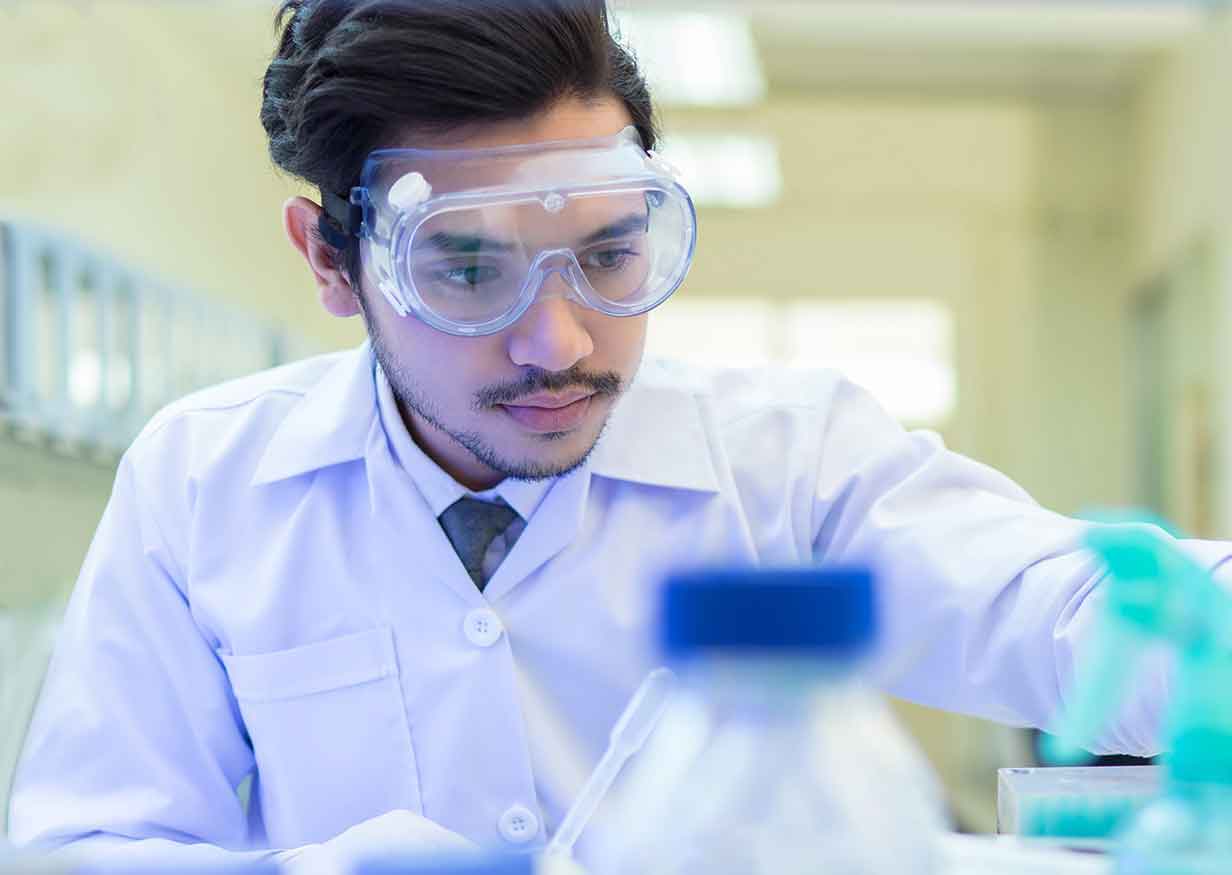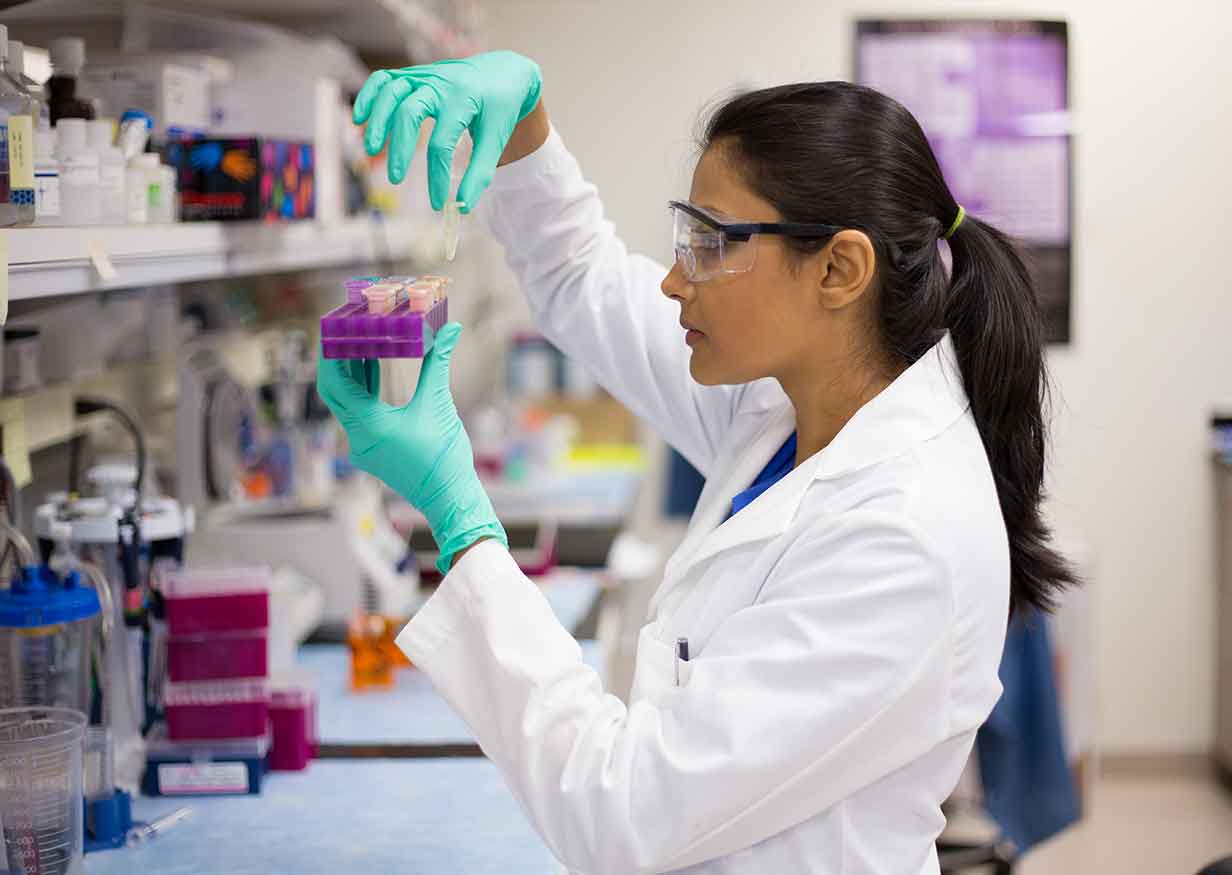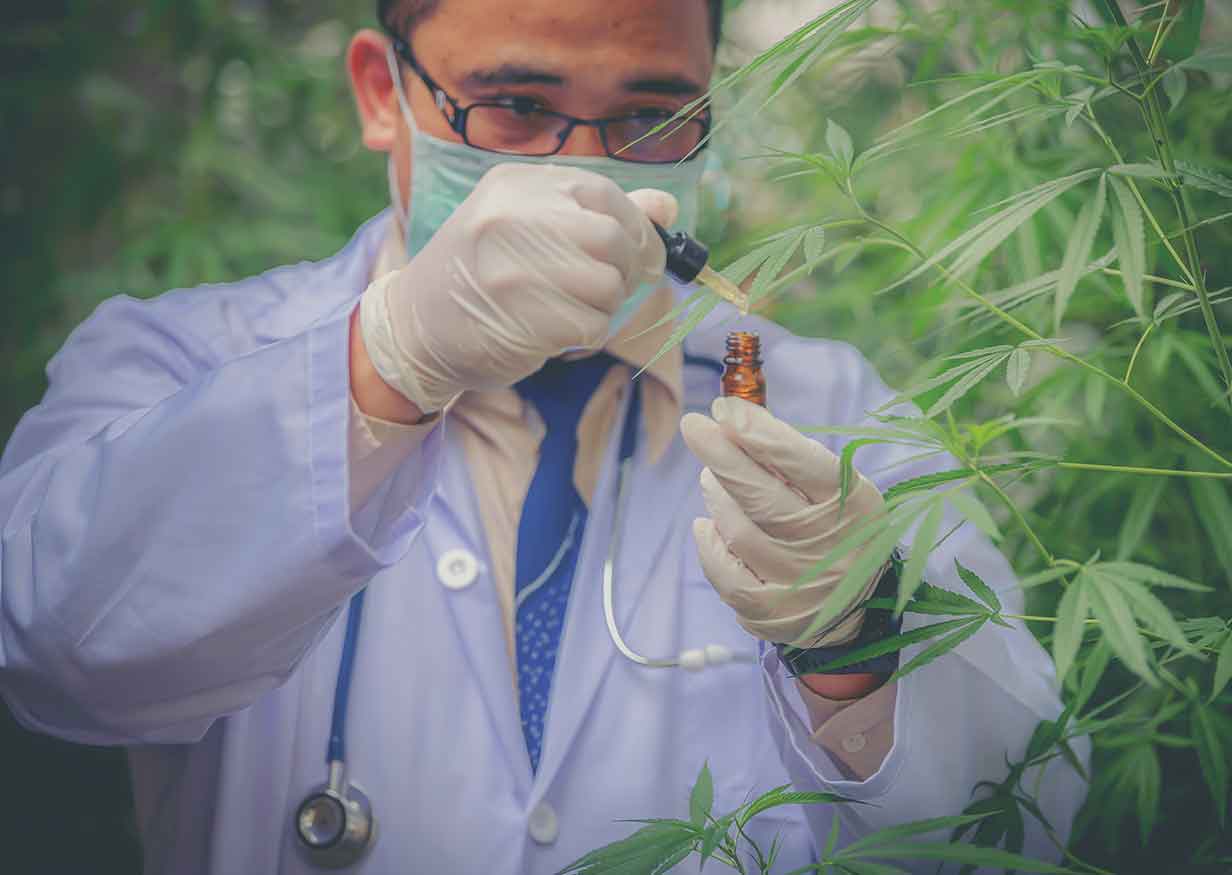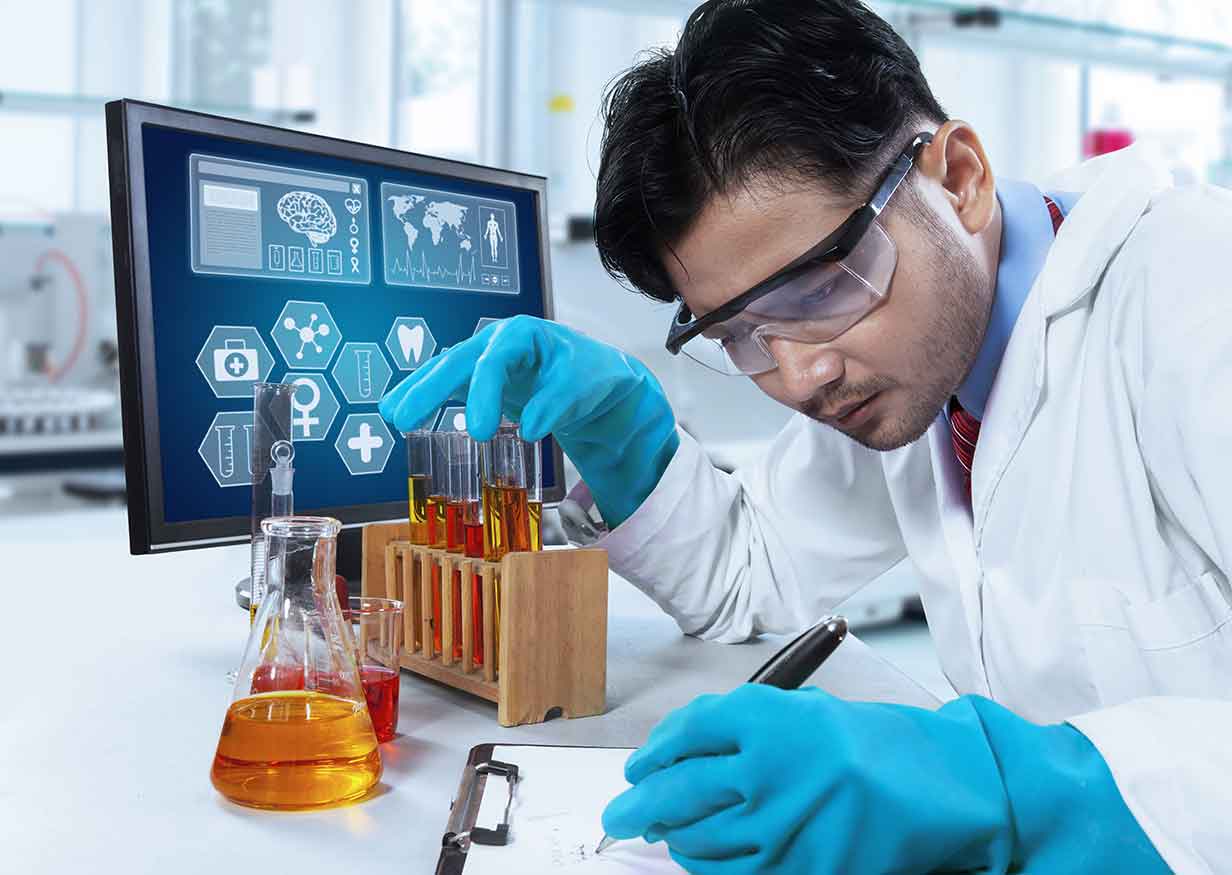PHARMACEUTICAL SCIENCES

Pharma Industry Laboratory Skills
Duration: 4 weeks
Registration Fee: INR 200
Course Fees: INR 800
Registration End: 10 December, 2020Course Commencement: 15 December, 2020.

Module 1: Safe Laboratory Operations
- Why laboratory safety deserves the highest priority.
- Safety symbols and safety gear.
- Hazard properties and safe handling of laboratory chemicals.
- Safe handling of laboratory glassware.
- Safe handling of laboratory instruments.
- Laboratory fire hazards prevention and control.
- Elementary laboratory first aid.
Module 2: Environmental Controls in Laboratories
- Significance of Cleanliness and Hygiene in laboratories.
- Monitoring and control of temperature and humidity.
- Laboratory waste disposal.
- Laboratory spills management.
Module 3: Sample Handling and Minimization of Analytical Errors
- Common units of analytical measurements.
- Sample preservation and management.
- Volumetric glassware grades and calibration.
- Analytical method validation.
- Essential precautions in dilutions and titrimetric analysis.
- Precautions in common laboratory determinations.
Module 4: Laboratory Standards and Reference Materials
- Primary and secondary laboratory standards.
- Revalidation of working standards.
- GLP and GDP.
- CAPA and uncertainty of measurements.
- Importance of calibration and record maintenance.
Module 5: Assurance of Quality of Results to Internal and External Customers
- Difference between Quality Assurance and Quality Control.
- Need for replicate analysis
- Internal laboratory audits.
- Customer feedback review for improvement of laboratory service.

Prof. Abdul Wadood Siddiqui
Email: dean.pharmacy@ramauniversity.ac.in
Contact No: 9899578978
Ms. Preeti Katiyar
Email: preetikatiyar.fphs@ramauniversity.ac.in

Courseware: Course material is provided in printed / electronic form.
Mode: Classroom presentation, lab demos, and hands-on training.
Eligibility: D.Pharma, B.Pharma, M.Phrama, Biotechnology, B.Sc., M.Sc., and Life sciences students can enroll
Attendance Policy: 75% attendance is compulsory for the award of the certificate.
Evaluation System: Based on the post-course exam ( MCQ ) and laboratory-based viva.
Certification: At the end of the program students will b awarded a certificate on successful completion of the course (min. 50 % score required).

After completing this course the student will be able to:
- Carry out Chemical, physical and instrumental analysis.
- Analytical tests for pharmaceuticals, food products, and biological products.
- Pharmaceutical product control sampling.
- Design and validate analytical techniques.
- Calibrate Analytical Instruments.
- Interpret analytical data.

- Commercial Testing Laboratories.
- Pharma and Food industries.
- Referral laboratories such as BIS, IPC.
- R&D laboratories in pharma and life sciences.
- Environmental monitoring and control laboratories.
- Forensic laboratories.
- Clinical Testing laboratories.

Preformulation Studies: Become a Smart Formulation Expert
Duration: 4 Weeks
Registration Fee: INR 200
Course Fees: INR 800
Registration End: 10 December, 2020Course Commencement: 15 December, 2020.

Module-1. Introduction to Pharmaceutical Formulation
Module-2. Role of Preformulation Studies in Drug Discovery
Module-3. Role of Preformulation Studies in Drug Development
Module-4. Aqueous solubility
Module-5. Permeability
Module-6. Stability Studies
Module-7. Solid-State Properties
Module-8. Compatibility Studies

Ms. Priya Tiwari
Email: priyatiwari.fphs@ramauniversity.ac.in
Ms. Pratiksha Jayaswal
Email: pratiksha.fphs@ramauniversity.ac.in
Mr. Peeyush
Email: Peeyush.fphs@ramauniversity.ac.in
Contact No: 9532674131

Courseware: Course material is provided in printed / electronic form.
Mode of Teaching: Classroom and Laboratory exercises (Lab demos and Hands-on Training)
Eligibility: Any student from B. Pharm/ M. Pharm. or other Life Sciences streams
Note: Limited seats are available. Registration will be on a first come and first serve basis.
Attendance Policy: 75% attendance is compulsory for the award of the certificate.
Evaluation System: MCQ quiz after each module.
Certification: Certificate will be provided after completion of the course (Score at least 60% to pass.)

- To understand the Dosage forms and their various manufacturing techniques.
- To understand all the related and practical aspects of dosage form development.
- To formulate and evaluate the dosage forms like solid, liquid, and semisolid dosage forms.
- To correlate the theoretical knowledge with the professional and practical needs of the Pharmaceutical industry.

- Molecular modification
- Quality control
- Clinical research
- Formulation development and evaluation
- Pharmaceutical Production

Standardization of Herbal Drugs
Duration: 4 Weeks
Registration Fee: INR 200
Course Fees: INR 800
Registration End: 10 December, 2020Course Commencement: 15 December, 2020.

Module 1: Introduction of standardization and role
Raw material
Finished products
Need of standardization
Problems In standardization
WHO guidelines
Career options in the herbal pharmaceutical industry
Module 2: Botanical parameters
Macroscopy (Organoleptic characteristics)
Microscopic characteristics
Foreign matter analysis
Module 3: Physico-chemical parameters
Extractive values
Ash values
Loss on drying/Moisture content
Volatile matter
Module 4: General parameters
Fluorescent analysis,
Powdered drug reaction with different reagent,
Phytochemical screening,
Determination of pH,
Determination of resin content,
Determination of fat content
Phenolic content
Module 5: Pharmacological parameters
Swelling index
Toxicological contaminants:
Arsenic and Heavy metals,
Pesticide residues,
Microbial load,
Aflatoxins
Module 6: Biological Evaluation & TLC fingerprinting analysis
Antidiabetic activity
TLC fingerprinting analysis / Quantification of active ingredients

Dr. Kamran Javed Naquvi
Email: kamranjaved.fphs@ramauniversity.ac.in

Courseware: Course material will be provided in printed / electronic form.
Mode: Classroom presentations, Lab demos, and Hands-on Training
Eligibility: 10+2 perusing D.Pharm/ B.Pharm/ Biotech; B.Sc. (Biology)/ Agriculture Sciences etc.
Attendance Policy: 75% attendance is compulsory for the award of the certificate.
Evaluation System: Based on post-course exam (MCQ) and Laboratory-based viva
Certification: At the end of the program the student will be awarded a certificate on successful completion of course. (Minimum 50% score required)

After completing this course the student will be able to:
- Understand the various parameters of the standardization of herbal drugs.
- Carry out the morphological, microscopical, Physico-chemical, biological evaluation of crude drugs.
- Carry out the evaluation of crude drugs.
- Skilled in the isolation of volatile oil and to carryout TLC analysis along with quantification of active ingredients.
- Skilled in the evaluation of herbal drugs/finished products in the herbal industries and government research organizations.
Prepare reports for clients/ organizations

- Private/government herbal research organizations and labs.
- AYUSH (Ministry of AYUSH, Government of India)
- Central Council for Research in Unani Medicines (CCRUM)
- Indian Council of Medical Research (ICMR)
- Central Council for Research in Ayurvedic Sciences (CCRAS)
- Ayurvedic/Unani/Homeopathic industries.

Advanced Pharmaceutical Techniques
Duration: 12 Weeks (12 hours per week, Total 144 Hours)
Registration Fee: INR 500
Course Fees: INR 7500
Registration End: July 15, 2020Course Commencement: August 16, 2020

Module 1: Overview of the Pharmaceutical Industry
- Overview of the pharmaceutical industry and its role in the healthcare system
- Career options in the pharmaceutical industry
- Different functional departments and their role in the pharmaceutical industry
- Drug Product Development
- Calibration of Glassware
- Preparations of Buffers and pH solutions
Module 2: Basics Concepts
- Basic pre-formulation properties
- Preparation and calculation of dilutions
- Dose estimation
- Interpretation of IR, NMR and Mass Spectrometry Graphs
Module 3: Analytical Techniques
- UV Spectroscopy
- HPLC
- Dissolution
Module 4: Bio-Pharmaceutical
- Bio-Pharmaceutical Assay
- Qualitative assay of carbohydrate, lipids, Vitamin
- Endpoint detection
- Moisture content analysis
- Viscosity
- Assay for Herbals
Module 5: Basic and Practical Handling of Instruments
- Homogenizer
- Probe sonicator
- Disintegration apparatus
- Friability Test Apparatus
- Rota evaporator
- Lyophilizer
- Electorspinner
- Franz Diffusion
- Orbital shaker
- Particle size analyzer
Module 6: Formulation Development and evaluation
- Tablet, Granules
- Cream, Ointment
- Lipid Vesicular system
- Solid Dispersion
- Nanoparticles
- Topical Film & Patch
- Eye Drops, Injection
Module 7: Sampling of Pharmaceutical Product and Related Materials:
- Sampling Process.
- Sampling Facilities.
- Responsibility of sampling.
- Health and Safety.
- Classes and types of Pharmaceutical products and related materials.
- Sampling on the recipient.
- Sampling for Starting materials, Packing materials, and Finish products.
Module 8: Evaluation of Packing Materials:
- Composition of packing.
- Purpose and importance of packing material testing.
- Package testing procedures.
- The ideal requirement for good packaging.
- Hazards encountered by a package.

Prof. Abdul Wadood Siddiqui
Email: dean.pharmacy@ramauniversity.ac.in
Contact No: 9899578978
Ms. Preeti Katiyar
Email: preetikatiyar2506@gmail.com
Ms. Preeti Verma
Email: preeti.fphs@ramauiversity.ac.in

Courseware: Course material will be provided in printed / electronic form.
Mode: Classroom presentations, Lab demos, and Hands-on Training
Eligibility: Undergraduate/ Postgraduate students of Pharmacy, Biotechnology, and Life Sciences.
Attendance Policy: 75% attendance is compulsory for the award of the certificate.
Evaluation System: Based on the post-course exam (MCQ) and Laboratory-based viva
Certification: At the end of the program the student will be awarded a certificate on successful completion of the course. (Minimum 50% score required)

On successful completion of this course, the student will be able to:
- Carry out analytical tests for pharmaceuticals, food products, and biologicals
- Design and validate analytical techniques
- Develop and optimize pharmaceutical formulations
- Calibrate Analytical Instruments
- Interpret analytical data
- Prepare reports for clients/organization

- Pharmaceutical Analytical Labs
- Food Products Analysis
- Research & Development Centres
- Formulation development and evaluation
- Pharmaceutical Production

Drug Design and Molecular Modelling
Duration: : 4 Weeks (12 hours a week, Total 48 hours)
Registration fee: INR 500
Course Fees: INR 5000
Registration End: July 31, 2020Course Commencement: August 16, 2020

Module 1 - Introduction to Computational Chemistry and Drug Discovery
- Drug and Drug properties
- Enzymes / Proteins / Receptors
- Pharmacodynamics / Pharmacokinetics
Module 2
- ADME rules- Drug Solubility and permeability
- Databases
- Target and Lead Identification/ Optimization
Module 3 - QSAR (Quantitative Structure-Activity Relationship)
- Physicochemical aspects of Biological activity of drug and chemicals
- SAR (Structural activity Relationship) and Applications of QSAR
- Chemical information and descriptors
- Statistical Methods in QSAR - MLR / PLS / PCA / ANN
- Validation of QSAR models - Internal and External validation
- End of the module with practices
Module 4 - Molecular Modeling / Docking Concepts
- Structure-Based Drug Design
- Structural based screening method Structure-based hit identification End of the module with practices
- Ligand Based Drug Design
- Ligand-based screening method Ligand-based hit identification End of the module with practices
- Statistical studies
- ADMET prediction by QikProp 3.3
- Validation of target Enrichment studies Parameter based screening MMGBSA (Binding energy calculation) Selection of lead molecule
Module 5
- Simulation Study

Dr. Abdul Wadood Siddiqui
Email: dean.pharmacy@ramauniversity.ac.in
Contact No: 9899578978
Dr. Amit Kumar Keshari
Email: amitkumar.fphs@ramauniversity.ac.in
Contact No: 7054090169
Ms. Preeti Verma
Email: preeti.fphs@ramauiversity.ac.in
Mrs. Sneha Kushwaha

Courseware: Course material will be provided in printed or electronic form
Mode of Teaching : Classroom and CADD Lab
Required Softwares: Autodock Vina Discovery, Studio Visualiser, ChemDraw Ultra 13, Maestro, Shrodinger, Database PDB, Drugbank, Zincpharmer Structure Database - NCBI, PDB
Intended Audience: Pharmaceuticals/ Biotech / Bioinformatics /Chemistry and allied programs, pharma industries, and researchers.
Prerequisites: Prior knowledge of biochemistry and bioinformatics. Students should be able to identify organic chemistry functional groups and chemical structures. Students should also know the parts of a cell and be comfortable working with mathematical expressions containing exponents and logarithms.
Attendance Criteria: 100 % in practical and 80% in theory
Evaluation System: MCQs on QSAR and molecular modeling (100 marks)
Certification: Certificate of participation will be provided at the end of the course (Minimum 60% score required)

- The student will be able to relate the chemical structure of a drug to its biological function.
- Students will be able to attend lectures on drug discovery and reasonably understand the content of the lectures.
- The Course content meets the industry standards.
- The participants will gain knowledge of computational drug design.

Data Scientist in Industries /Labs
- Research Associate in Medicinal Chemistry
- Project Assistant
- Professorship- Drug Discovery and Medicinal Chemistry
- Bioinformaticist in the health sector
- Postdoctoral positions
- Computational Biophysicists
- Business Development Executive

Experimental Pharmacology by Software
Duration: 4 weeks, 6 Hours per week, Total 24 Hours
Registration Fee: INR 100
Course Fees: INR 1500
Registration End: July 31, 2020Course Commencement: August 16, 2020

COURSE CONTENT
- Study of muscle relaxant activity with the help of “Rota-Rod Apparatus”.
- Study of CNS depressants & stimulants using "actophotometer".
- Study of analgesic activity with the help of a "tail-flick apparatus".
- Study of antihistaminic drugs with the help of the histamine chamber.
- Study of analgesic activity with the help of a "hot plate apparatus".
- Study of drugs acting on CNS using "elevated plus maze".
- Study of anticonvulsant activity using "electro covulsiometer".
- Experiment on the effects of various drugs on the rabbit's eye.
- To study analgesic activity by writhing test.
- To study PTZ induced convulsions in mice
- Effect of different drugs on frog's heart
- Experiment on bioassay of histamine on the ileum of guinea pig
- Effect of adrenaline, acetylcholine, and atropine on dog arterial pressure.
- Experiments on rat BP
- Experiments of rat blood sugar
- To record the dose-response curve and to determine the PD2 value for acetylcholine on the frog rectus abdominal muscle.
- Study of diuretic activity using metabolic cage
- Study of anti-inflammatory activity using carrageenan-induced paw edema method
- Bioassay of oxytocin on the isolated rat uterine horn
- Bioassay of serotonin on the isolated rat fundus strip
- Rabbit Pyrogen Test
- Effects of drugs on the dog BP and Heart Rate
- Effects of drugs on the ciliary motility of frog esophagus

Mr. Nishant Singh Katiyar
Email: nishantkatiyar.fphs@ramauniversity.ac.in
Contact No: 9455076190

Courseware: Course material is provided in printed / electronic form.
Mode: Classroom and computer lab training.
Eligibility: Undergraduate/ Postgraduate students of Pharmacy, Nursing, Biotechnology, and Zoology.
Attendance Policy: 75% attendance is compulsory for the award of the certificate.
Evaluation System: Based on the post-course exam (MCQ)

On successful completion of this course the students will be able:
- To understand the effect of drugs on animals by simulated experiments
- To understand the effects of drugs on isolated animal tissues by simulated experiments.
- To understood the concepts of drug action and mechanisms involved.
- To understand the importance of isolated preparation, mechanism of action of drugs on isolated tissues, expertise in performing bioassay of drugs.
- To understand the drug antagonism using isolated tissue preparations.

Pharmacology is a broad sector and students (participants) will develop skills in experimental pharmacology for getting a job in the industry and governmental research and development sector as a:
- Academic researcher
- Biomedical scientist
- Clinical research associate
- Pharmacologist
- Research scientist (life sciences)
- Research scientist (medical)